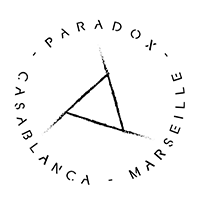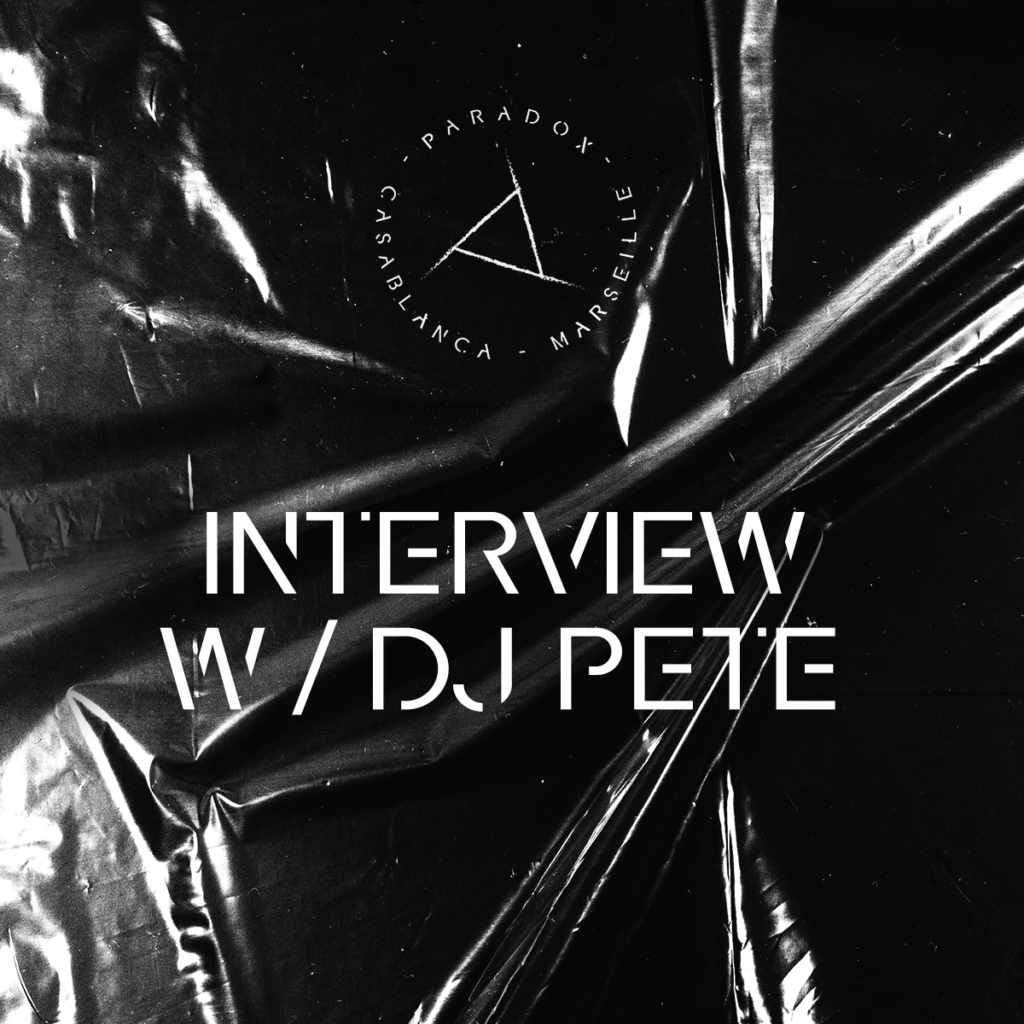We had the great chance to sit down with the Berlin Techno pioneer DJ Pete to speak about landmarks of his long career, his upcoming projects and his view on the future of the Techno scene. The Berghain resident showed a deep and wise vision on being a DJ and electronic music producer in the current music business, and even gave some useful tips for uprising artists. Enjoy the read!
- You started your career in 1988 as a Techno DJ in Berlin, it was the very first years that techno was emerging in Europe, so something not very famous or even well-known. How did you decide that this was the music you wanted to play ?
In the 80s I was listening to pretty normal music. All types of dance music that was broadcasted on radio in Germany and played in discotheques until bands like Nitzer Ebb and D.A.F. crossed my way and got my full attention. Their stripped down music to me was so much more on point than other stuff. Synth tracks with less vocals, music made with machines was something for me to look out for, music where not the lyrics play a major role. I never was too much into Hip Hop, but I’ve had loads of fun listening to tracks like Planet Rock by Soulsonic Force and similar Electro.
- We can read in your bio that you’ve been the longest serving staff member of the legendary Hard Wax record store in Berlin, has the spirit remained the same since 1991 in there ?
Supporting cutting edge music and filtering the huge offer of records to make it easier for a Hard Wax customer to do a selection remained a major tool at Hard Wax to keep the spirit. It still is about finding interesting music off the mainstream. The pioneering spirit keeps on living in a kind of decent way. Loads of stuff for customer and staff in the shop got optimized for easy business and treatment. Looking at the customers when they buy their selection makes me see the Techno spirit that I’m used to see throughout the years. Frequently new people find the shop and you can see them being impressed when entering the shop.
- By that time your inspirations were coming from electronic music as well or were you inspired by other genres ? What were your references ?
Forming a general music taste mainly happened in the mid / late 80s and the beginning of the 90s. Other genres to mention that inspired me were Synth-Pop, EBM, SKA, Electro (pre Hip Hop), High Energy and New Beat. It is funny for me to see that I am such a Reggae and Dubstep head now when I remember my SKA-party times as a teenager.
- You started in the late 80’s, you worked for Hard Wax, you’ve been a resident of Berghain since the opening of the club, you released the very first CD that was made thanks to Ableton Live in 2002… We can say that everything that people are doing now, you did it already way before, so what’s going to come next, what will be the next trend for you ?
Currently, I’m happy with my regular DJ schedule, making podcasts and browsing thru new music to build sets. An ongoing project of mine definitely is making my own music. Thru the years, I was building several Remixes which kept me kind of trained to not totally loose the connection to my home recording studio. Rebuilding and optimizing my studio to make own music came back to the surface and I hope that there’s more time to learn more about my current way of DJing with CDJs. DJing and a few live music projects keep myself entertained and challenged. I do what’s possible for me on the border of getting stressed out.
- Some months ago we read from an article relating the experience of several DJs such as Laurent Garnier that a DJ’s lifestyle is pretty tough to handle sometimes. We know passion helps a lot, but can we say that making a career out of your passion is exhausting sometimes ?
I don’t have to do everything that I’m passionate about at the same time. Fortunately most career building things are fun. Making a career out of your passion is still a great thing to do. Finding new music and combining tracks to a set to play gives me enough excitement. I’m looking forward to bring my set to the club, play it for the people and having a very good work space will definitely give me an inspiring rush, as well as peoples feedback at the club to keep on doing what I love to do. I’m aware of the chance to loose my passion when forming a job out of it, so as soon as you realize that it is not fun anymore what you’re doing it’s time to optimize and rearrange things in your life.
- Do you have a precise moment in your career that you’ll never forget, or that was a key moment for you ?
There are many moments, of course. If you want me to strip it down to one, I would have to say that it was when Jeff Mills played one of his first ever DJ set at Tresor in the early 90s. He played 2 copies of Steve Poindexter’s „Work That Motherfucker“ and presented his skills that he formed thru the years as “The Wizzard“. At that time, I knew about Turntableism a bit from Hip Hop, but when it got shown by Jeff in a Techno environment I was blown away.
- We usually hear that electronic music is very mechanic, detractors even try to intend that it’s maybe too linear. You mixed techno with live vocals alongside Paul St. Hilaire or played an improvisational live act with Sleeparchive as TR-101, is this your way of showing that electronic music can be diversely done and as much considered as any other kind of music ?
Human nature can not take 100% precision in music too long, I guess, and often boredom occurs when music is too perfect and is sequenced by computers only. Adding a human aspect to electronic music often is a plus. The Tikiman show and TR-101 are good examples. Accuracy supposed to be decided by the artist and not by a machine.
- You played all around the globe, from Belgium to Japan, in Israel or in Georgia, do you adapt your sets regarding to the culture you’re going to face and its taste in techno ?
I look at the line up of the night where I’m added to, to the club size and colleagues that played there previously. If the location is a dark cellar club or more an open air place. Techno is universal and I trust my style. I was never totally placed wrong at a club, fortunately.
- What would be your advice to a young artist that is emerging on this scene ? Be focused on what is being released and go with the flow or always keep in mind what was done before ?
Focus on music that is currently driving you, but be aware of the past. Compare and choose what suits you best. If you can not decide if you like a track, leave it. Start with compiling music in similar style to build your collection. As soon as you get bored with compiling similar styles, you automatically open up for new stuff in the most optimal case. Listen to your environment, absorb sounds in urban life, nature and people. Analyse the music on the technical and musical aspects, but never forget to just listen to the music. Try to avoid looking at your computer screen too much. Practise mixing and it all will come. Organize your sleep during the week, find continuous bedtimes and do something totally off the the music business for your body and soul to ease up things that got out of balance due the effects of club life. Don’t try to be present all the time, it can be stressful.
- With this incomparable knowledge that you have of this techno scene, what are your thoughts concerning the current scene ?
The current scene in Europe offers everything that you can imagine and it seems to grow. Surely Berlin’s scene is unique in offering endless clubbing at very diverse clubs a good amount of record stores, radio shows and locals being DJs. These things are probably essential to start a scene, not to forget the music lovers and dancers of course. So far, everywhere I play these things are existing, too or are currently in a development process and it makes me optimistic that the global acceptance of Techno grows.
Some other thoughts are here. Fast rise of newcomers. More sub-genres and micro scenes. More DJs than ever. Day parties and after hours became more popular and often the new alternative, offering higher quality music and DJs than the regular night time clubbing. Berlin is a long term international hotspot and I can’t remember that a german city has ever been in a similar position. I hope the current scene will be stable and will develop in a good way, for everybody to get happy with it. Party smart!
Thanks a lot Peter, we hope to see you very soon somewhere, keep the cool vibe on!

